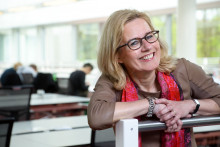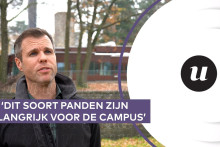It’s one thing to identify that there’s a shortage of technological experts on the labor market, it’s another to fix it. How does TechYourFuture go about this?
‘We focus on both ends of the school-labor market continuum. At secondary schools in the eastern part of the Netherlands, we try to stimulate kids to choose math, physics and chemistry as their exam subjects, enabling them to opt for a technological career later. Girls are an important focus in this; they traditionally specialize less often in science subjects. For that reason, we sometimes also organize fun events for girls, like a girls day...
Moreover, we try to ensure that what pupils learn at school matches employers’ needs. To that end, we engage in meaningful research in this area, but also support high school teachers. We offer them, among others, interesting educational materials and train them. Teachers play a pivotal role in getting more technologists onto the labor market: after all it’s they who enthuse kids in the classroom. Finally, when kids learn to love science and technology at an early age, it becomes more natural for them to engage with these subjects later. For that reason, our efforts also extend to primary school teachers and their pupils.’
Technologies are rarely applied in a vacuum; they are used in a broader societal context. Should a focus on science and technology therefore not be broadened to include a focus on the social sciences, conform UT’s ‘high tech, human touch’ credo?
‘Definitely. And it’s not just UT that emphasizes this importance, so do our partner organizations in TechYourFuture: the universities of applied sciences Saxion and Windesheim. One reason why we are all so strongly committed to embedding science and technology into a wider societal context is because of employers’ feedback.They want professionals who are both technology experts and possess broad social skills and insights – so-called 21st century skills – to deal with society’s complex problems. Also, they need people who can work in a multidisciplinary team.
To this end, several of our research projects mingle technology with other topics, such as citizenship and languages. We also promote so-called meaningfulscience and technology education, in which pupils apply their tech and science skills to help businesses and NGOs find multidisciplinary solutions for their problems.’
How successful has TechYourFuture been thus far?
‘That’s a little hard to tell at this stage, to be honest. For instance, more girls are now opting for technology-related studies at institutes of higher education – hopefully partially thanks to our efforts, which started in 2013. But many results are not yet measurable. The effects of our projects for primary school children will only be visible when they enter the labor market in about 15 years time, for instance. And even when more secondary school pupils opt for science and technology-oriented subjects, won’t we necessarily have reached our goal. There is a huge ‘drop out’ of potential engineers and technologists at the intersection high school - institutes of higher learning: many pupils who chose to take their final exams in science and technology subjects do not pursue this interest when entering college. Moreover, the curriculum that institutes of higher education offer does not always match employers’ expectations. Consequently, only 44 per cent of all technology students actually end up in a technology job in the Netherlands. Lower educational and training institutes experience similar problems. In short, the problems we are trying to tackle are complex and multifaceted, and don’t have a quick fix.’
Isn’t TechYourFuture’s focus on the east of the Netherlands too narrow to tackle these problems?
‘We are seeking to expand our horizons, actually. Our dream is to become a national Centre of Expertise. Meanwhile, we already work with organizations outside the east when deemed useful. One example is Science Center Nemo in Amsterdam, a museum and educational center for kids. As part of the National Science Agenda – a Dutch governmental effort to find out what Dutch citizens deem to be important issues for scientists to study – 50 school kids recently gathered in the museum with a number of questions they would like to see answered by scientists. The gathered scientists, in turn, taught them to phrase questions in such a way that you can actually research them scientifically. The day was a huge success.’
Does TechYourFuture also have international ambitions?
‘Right now, we are focusing on the Netherlands. But it’s a global world, of course, so sometimes we also cross the border. Last month, 330 pupils from Twente joined us in visiting the Hannover Messe, the biggest trade fair for industrial technology, for instance…’
This article can also be read in the May edition of UT Nieuws Magazine







